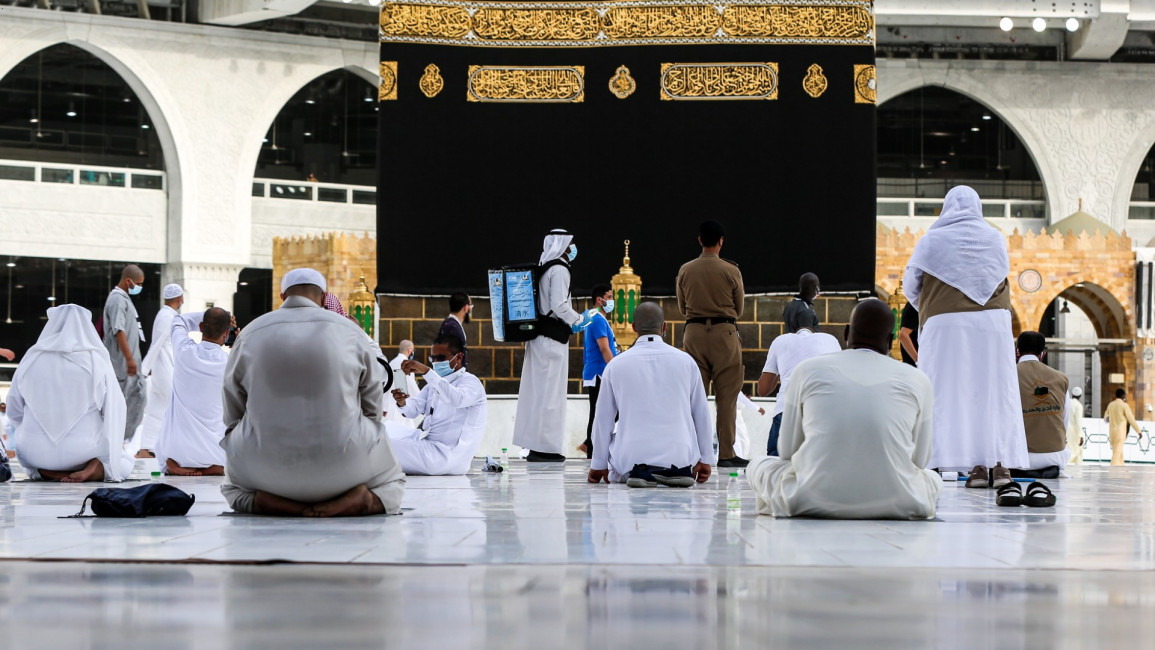Mecca opens doors to outside visitors for the first time since Covid-19 closure
The third phase for the gradual return of pilgrims in Mecca started on Sunday night, according to an official Saudi News channel.
The move sees 20,000 Umrah pilgrims allowed into the Grand Mosque, as well as 60,000 worshippers for visits and prayers, the report said.
Umrah, the pilgrimage to Mecca that can be undertaken at any time, usually attracts millions of Muslims from across the globe each year.
It has been revived in three stages, with the initial phase earlier this month seeing just 6,000 citizens and residents already within the kingdom allowed to take part each day.
Worshippers were able to perform the ritual of circling the sacred Kaaba - a cubic structure inside the Grand Mosque towards which Muslims around the world pray - along socially distanced paths.
On 18 October, the number of pilgrims was set to be increased to 15,000 per day, with a maximum of 40,000 people allowed to perform prayers at the mosque.
Twitter Post
|
The decision to resume the pilgrimage was in response to the "aspirations of Muslims home and abroad" to perform the ritual and visit the holy sites, the interior ministry said last month.
It added that the Umrah would be allowed to return to full capacity once the threat of the pandemic has abated.
Until then, the health ministry will vet countries from which pilgrims are allowed to enter based on the health risks.
Those wishing to perform the umrah must apply through two mobile applications: one to confirm they are free from the virus, and another from which they can obtain a permit.
Logistical challenge
Saudi Arabia suspended the Umrah in March and scaled back the annual Hajj over fears that the coronavirus could spread to Islam's holiest cities.
The Hajj went ahead in late July, on the smallest scale in modern history, with only up to 10,000 Muslims allowed to take part - a far cry from the 2.5 million who participated last year.
State media have said that a raft of precautions have been adopted to ward off any outbreaks during the umrah.
The revered Black Stone in the eastern corner of the Kaaba - which it is customary but not mandatory to touch during the pilgrimage - will be out of reach, while the Grand Mosque will be regularly sterilised before and after each group of worshippers.
Each group will be accompanied by a health worker and medical teams will be on the ground in case of an emergency.
The pilgrimages are a massive logistical challenge for organisers, with colossal crowds cramming into relatively small holy sites, making them vulnerable to contagion.
Read also: WATCH: Saudi man crashes car into gates of Mecca's Grand Mosque
Saudi Arabia's custodianship of Mecca and Medina - Islam's two holiest sites - is seen as its most powerful source of political legitimacy.
The holy sites are also a key revenue earner for the kingdom, whose economy has been badly hit by a coronavirus-driven collapse in global demand for oil.
Follow us on Facebook, Twitter and Instagram to stay connected



